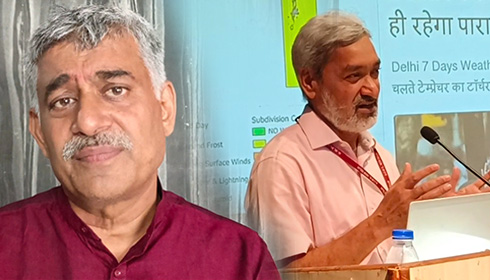
Surviving Extreme Heat: AIIMS Doctors Share Vital Tips
This year's unprecedented heat waves across Northern India and other regions have posed severe health risks, drastically impacting daily life. Many people have limited outdoor activities to avoid heat-related illnesses.
However, with proper precautions, it is possible to cope with the extreme heat, as emphasised by experts from the All India Institute of Medical Sciences (AIIMS), Delhi, during a public lecture on heat-related illnesses.
Prof. Sanjay K Rai from the Department of Community Medicine at AIIMS-Delhi highlighted the severity of heat stroke, which can result from prolonged exposure to high temperatures, often exceeding 48 degrees Celsius. He explained that heat stroke can lead to high-grade fever and, in extreme cases, be fatal. It is, however, preventable and treatable with the right measures.
Heat stroke occurs when the body fails to regulate its temperature due to exhaustion and dehydration, primarily caused by a deficiency of sodium and water. Symptoms include confusion, body aches, vomiting, weakness, and seizures.
Immediate medical attention is crucial in such cases. To combat the heat, it is important to avoid exposure to direct sunlight between 12 PM and 4 PM. If outdoor activities are necessary during these hours, using an umbrella and wearing light, breathable clothing can help mitigate the effects. Staying hydrated is essential; drinking water regularly, even in the absence of thirst, helps maintain hydration and prevent heat-related issues.
In cases of heat stroke, moving the affected person to a cool place and seeking prompt medical treatment is critical. Rapid cooling and hydration are essential to counteract the effects of heat stroke.
Prof. Rai also warned about the risks of dehydration, which can lead to severe complications like kidney failure. The body's thermoregulatory mechanism can be overwhelmed by prolonged heat exposure, making it difficult to recover from fever even with medication.
Prof. Kaushal K Verma, Dean of Academics and Head of Dermatology at AIIMS, advised on managing skin problems caused by excessive sweating, such as fungal, bacterial, and viral infections.
He recommended that those engaged in physical labor should keep water bottles and wet cloths handy to stay hydrated and cool. Regular bathing, including an evening shower, and the use of coconut oil can help maintain skin health and prevent infections.
Dr. Ranveer Singh Jadoon from Internal Medicine described two types of heat stroke: exertional and non-exertional. Exertional heat stroke results from intense physical activity, while non-exertional heat stroke occurs without physical exertion, often due to high ambient temperatures.
By following these expert tips from AIIMS doctors, individuals can better protect themselves from the extreme heat and its potentially life-threatening effects. Taking proactive steps to stay cool and hydrated is key to surviving and thriving in the face of rising temperatures.